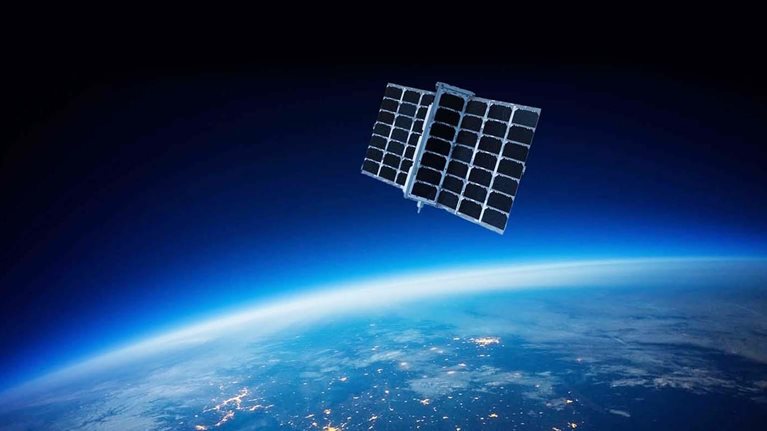Joe Landon envisions a new economy developing in space—one that closely mirrors the economy on Earth and requires the same skills. “What the space industry needs is more business talent and more people who understand how to build businesses,” he says. As vice president of advanced programs development for Lockheed Martin Space, Landon leads teams that focus on new-business growth, strategy, and R&D for human spaceflight, robotic deep-space exploration, and other space-related activities. He is filling this role at an exciting time for the company, which was recently awarded a NASA contract to develop a first-of-its-kind commercial space station that will facilitate research, plant growth, and astronaut activity in space.
“My job is to predict the future,” Landon says, “and the hardest part is figuring out how to position our company in an increasingly competitive market.” He recently met with McKinsey’s Chris Daehnick to discuss the future of space. The following are edited excerpts of their conversation.
The ‘space for space’ economy
Chris Daehnick: As you said, your job is to predict the future. What do you see happening in space in the next ten years or so?
Joe Landon: I think what we’re going to see in the future is “space for space.” Historically, the term “space economy” has been a bit of a misnomer because all of the value was exchanged between people on Earth. Since the 1960s, the vast majority of activity and investment has been in launching satellites that look down on Earth, or that help us communicate from one place to another on Earth. Those are space-for-Earth services. Now, we’re going to start seeing more value being created and exchanged in space, for space.
For example, you could have a spacecraft that gets refueled in space. That’s a transaction or activity that doesn’t have an anchor on Earth. It’s happening between two companies or two spacecraft, either in orbit or maybe on the moon.
Also in the future, I see a world where getting things into space is essentially free of charge. The only thing that will cost money is sending people into space because people can’t be printed or produced in space. The other things we need in space will be produced there, using resources also found in space. We’ll be able to find building materials and everything else we need there. I think there could be a major disruption in the industry because of additive manufacturing and 3-D printing.

The future of space: It’s getting crowded out there
Trips to Mars—and beyond
Chris Daehnick: What is the most exciting thing happening in the space business today?
Joe Landon: I’m a little bit biased, but I think it’s NASA’s Artemis Program, which focuses on exploring the moon and sending humans back there. Lockheed Martin is the primary contractor building the Orion spacecraft for this program. There’s tremendous scientific benefit to Earth from the Artemis exploration. NASA and the space industry are laying the foundation to build infrastructure in space and around the moon.
Chris Daehnick: Do you think that there is a near-term possibility for some of the more expansive space ideas, such as human settlements on Mars or orbital space cities?
Joe Landon: I’m optimistic that we will continue to explore and go further. We’ll need to figure out what activity will create value, whether that’s scientific value or economic value or other opportunities. If we can build more self-sustaining operations and settlements in space, that can be a source of value. But I think it’s going to take a lot longer for humans to get to Mars than most people expect. It’s not that we won’t try; we are actually investing quite a bit to make the systems needed. There has also been extensive exploration beyond the moon, and even beyond Mars, using robotic spacecraft.
But the technical challenges are significant. Getting humans beyond Mars is a real challenge because it’s very far. You start having trouble generating power and communicating. There are some technologies that we’re developing that can help, and if we can build upon these technologies, I think it will be possible to explore the outer solar system.
Chris Daehnick: Space is a rather unforgiving environment. What are some of the challenges that we have to overcome to enable humans to spend a long time there?
Joe Landon: We need to develop the technology to support a long-term presence in space and long-duration space flights. We also need the consumables required to support life for long periods. We’re working on and investing in the propulsion technology required to make trips in space faster. The shorter the trip is, the easier it is to keep the crew comfortable. We’re also working on artificial-intelligence systems to help crews manage their time in space and work alongside their spacecraft with limited help from Earth. We want to provide a safe journey for those astronauts.
As you get farther away from Earth, you can’t rely on Earth for help. So we need to anticipate and be able to take care of problems in deep space.
Chris Daehnick: Is there any ongoing research to understand how people deal with long-term confinement in a restricted environment?
Joe Landon: Sure, there are a number of programs called space analogs—there’s the Mars Desert Research Station, in Utah, and a facility in Hawaii called HI-SEAS—where we send crews into confined environments that simulate being on Mars or being on a long-duration space flight.
The role of private companies and government agencies
Chris Daehnick: Let’s talk about funding. Governments have traditionally funded space ventures, but many private companies are becoming involved in space tourism and other activities. How do you see the role of private companies and the government evolving?
Joe Landon: A lot of private investment is now going into launch vehicles and launch availability. Both government and private industry have benefited greatly from that because it reduces costs and increases the ability to get stuff into space more reliably and more often. A lot of private investment is also going to communications and Earth observation. Having those types of services expand and become more readily available will help everyone. For instance, we might soon have ubiquitous internet connectivity.
For science and space exploration, the government is still going to be the major customer. But government agencies, NASA in particular, are going to make purchases and do business in a more commercial way. We have to adapt to an environment in which NASA will be buying services and expecting companies to develop new product offerings or new businesses. Once a company like ours develops a service for NASA, we can then offer it to other customers, including commercial companies, government agencies, and other national space agencies.
Think about a scientific mission to study the moon. NASA or another agency would not need its own communications link, power, or transportation; it could instead buy those as a service. In fact, NASA has already started to do this for the transport of payloads to the moon. Companies that provide that service for NASA could do the same thing for other customers. This would expand the market and bring in new opportunities.
Chris Daehnick: What does that mean for space companies? Do they need to change the way they do business?
Joe Landon: We have to stop thinking about ourselves as space companies and start thinking about the actual services that we’re providing. Space is a place, and we need all kinds of businesses there. We need to think about building a diverse and robust industrial sector in space. Now is the time to start partnering with the leading companies that provide those types of services on Earth and bring the best that we have into space. For example, Lockheed Martin and General Motors are working together to build the next generation of lunar rovers. We’ve taken the best of Earth transportation to adapt for space.
Big, established companies like Lockheed Martin have to act more like start-ups these days. There’s more collaboration between start-ups and established companies now, but also more competition. Overall, I think that’s good for the industry.
Chris Daehnick: What would you say to a young person today who is thinking about pursuing a career in space? What should they study?
Joe Landon: We need all kinds of talent in space. Of course, engineers and scientists are needed, but that’s just the beginning. Space is just a place—it’s a place where you can do business—so we’ll need doctors, lawyers, and everything you can imagine in space.
We’ll need more people who understand how to build businesses. To build this commercial space economy that we aspire to, we’ll need entrepreneurs and people who understand finance, marketing, accounting, and all these fields that aren’t typically associated with space but have always been a part of the space sector. Those fields will grow in importance going forward.



